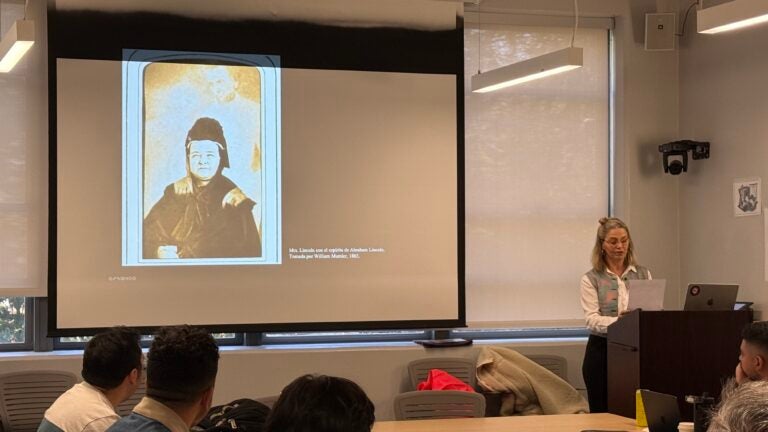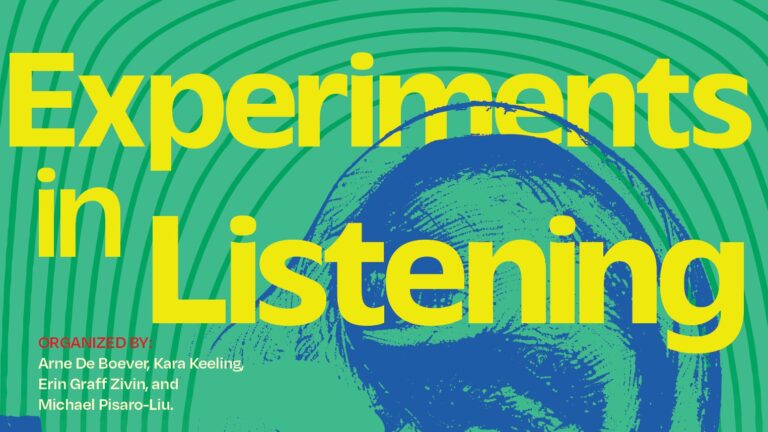Foto Con Papá
Date: 1/27/25
Time: 3-4:30 P.M
Location: THH 309K
Invited Scholar: Paola Cortes Rocca
boundary 2/CalArts
boundary 2/CalArts
Experiments in Listening
Friday, January 24- University of Southern California
Saturday January 25, 2025- California Institute of the Arts
Experiments in Visual Rhythm: An Evening with Cauleen Smith
Date: Thursday, Nov 21, 2024
Time: 7:00-8:30 p.m.
Location: Ray Stark Family Theater (SCA 108)
Organizers: Erin Graff Zivin, Kara Keeling
Adaptation: A conversation between USC Professor Viet Thanh Nguyen (author of The Sympathizer) and Maegan Houang (writer and co-producer of HBO Series The Sympathizer)
Tuesday, October 29 6:30pm – 8:30pm Soho House
For the second event in the Adaptations series co-hosted by the USC Dornsife Experimental Humanities Lab and Soho House, USC Professor Viet Thanh Nguyen will be in conversation with Maegan Houang, writer and coproducer of the acclaimed HBO adaptation based on Nguyen’s Pulitzer Prize winning novel, The Sympathizer. The HBO series stars Hoa Xuande, Sandra Oh, and Robert Downey Jr., and has been called a “Tour de Force” adaptation by Rolling Stone magazine.
Lecture by Prof. Michael B. Gillespie (NYU): “The First Time I Laughed After September 11th : Sonic Blackness and the Idea of Post-9/11 America”
Date: Thursday, September 12th, 2024
Time: 2:00-4:00 p.m.
Location: School of Cinematic Arts – SCA (SCA), 112
Invited Scholar: Michael Gillespie
“‘(Rhy)pistemologies’: Thinking Through Rhythm”
“‘(Rhy)pistemologies’: Thinking Through Rhythm”
Wednesday, May 8th 5pm-8pm and Thursday, May 9th 10am-8pm
Art Share L.A., 801 E 4th Pl, Los Angeles, CA 90013
Speakers: Michael Sawyer, Michael Gallope, Michael Love, Maya Kronfeld, Alex Chávez.
Photo Credits: Inger Flem Soto Analogue photograph taken during the 2019 Chilean Mass Protests (“Estallido Social”).
Julio Premat: Does Literature Dream of Electric Futures? Fiction and Technological Anticipation
April 24th
12:30-2:00PM at WPH B30
Julio Premat ( Université Paris 8 – IUF – CONICET) is professor of Latin American Literature at the Université Paris 8, and has published several books, including: La dicha de Saturno, Escritura y melancolia en la obra de Juan Jose Saer (2002), and Borges. La reinvencion de la literatura (2002).
Genre and Impact: Academic Writing in a Time of Experiment and Change with Ken Wissoker (Duke UP)
Wednesday, April 17, 2024, 3:30-5pm. Registration is required: https://forms.gle/6CXU1mCPEspu7uWVA
Join the USC Society of Fellows in the Humanities and the USC Dornsife Experimental Humanities Lab for talk by Ken Wissoker.
Ken Wissoker is Senior Executive Editor at Duke University Press, acquiring books across the humanities, social sciences, and the arts. In addition to his duties at the Press, he serves as Director of Intellectual Publics at The Graduate Center, CUNY and is currently Vice President for Publications at the College Art Association. He has published more than fourteen-hundred books which have won over one hundred and eighty prizes. Among the authors whose books he has published are Stuart Hall, Donna Haraway, Eve Kosofsky Sedgwick, Achille Mbembe, Lauren Berlant, Jack Halberstam, Sara Ahmed, Christina Sharpe, Fred Moten, and Lisa Lowe, along with USC colleagues including Dorinne Kondo, Tara McPherson, Kara Keeling, Sarah Banet-Weiser, and Jonathan Leal (among many others).
Questions? Email the Society of Fellows at societyoffellows@usc.dornsife.edu.
Homosexual Front for Revolutionary Action and 1970s Spanish and French Queer Experimental Cinema
Wednesday, April 17, 2024 11:30am to 1:30pm
Taper Hall (THH) 309K, 3501 Trousdale Parkway, Los Angeles, CA 90089
The Dornsife Experimental Humanities Lab cordially invites you to a conference dedicated to the Homosexual Front for Revolutionary Action and 1970s Spanish and French Queer Experimental Cinema: The Films of Adolpho Arrieta and Lionel Soukaz with Juan Antonio Suarez (University of Murcia), Antoine Idier (Institute of Political Science, Saint-Germain-en-Laye), Jennifer J. Wild (USC), Guillermo Rodriguez (CSU, Northridge), and Perwana Nazif (USC).
Adaptation: American Fiction with Cord Jefferson and Percival Everett
Monday, March 4th
6:30pm-8:00pm
Soho Warehouse (1000 S Santa Fe Ave, Los Angeles)
Ancestral Clouds, Ancestral Claims (Dir. Arjuna Neuman and Denise Ferreira da Silva)
January 18, 2024, 7:00pm
Screening and Discussion with Dr. Ferreira da Silva (NYU)
Ray Stark Family Theater (SCA 108)
Co-sponsored by the USC Dornsife Experimental Humanities Lab, USC Society of Fellows in the Humanities, Department of Latin American and Iberian Cultures
“Narcisa Hirsch: In Relation”
“Narcisa Hirsch: In Relation” exhibition at USC Fisher, October 6 – December 9, 2023
Experimental Matter: Narcisa Hirsch’s Films
Experimental Matter: Narcisa Hirsch’s Films
This special film screening event which complements the USC Fisher Museum of Art exhibition, Narcisa Hirsch: In Relation, will showcase a carefully curated selection of films spanning over half a century. You’ll have the opportunity to delve into the conceptual, formal, sensual, and metaphysical themes that populate Hirsch’s frames through early films in super 8 and 16mm, which have been recently digitized at the USC Digital Repository. These historic films will be screened alongside her more recent video work “Materia Negra” (Dark Matter) from 2023.
The one-hour screening will be followed by a 30-minute panel discussion with Erin Graff Zivin (Professor of Spanish and Portuguese and Comparative Literature, USC), Noraedén Mora Méndez (Postdoctoral Teaching Fellow, Latin American and Iberian Cultures, USC), Inger Flem Soto (Doctoral Candidate, Comparative Studies in Literature and Culture, USC), and Franchesca Rotger (PhD student, Comparative Studies in Literature and Culture, USC). Light refreshments will be served after the Q&A.
“Narcisa Hirsch: transgenérico”
Narcisa Hirsch: transgenérico” LA Filmforum event at 2220 Arts + Archives (the pictures here are from this event), October 1, 2023
Experiments in Art and Thought Darol Olu Kae, Keeping Time
October 18, 2023, 2pm
Screening and Discussion with Director and Professor Kara Keeling
At Albert R. and Dana Broccoli Theatre (SCA 112)
Precarity in Film: Experimental Ecologies
Precarity—a concept referring to dispossession, scarcity, displacement, and uncertainty—is increasingly common not only in social scientific literature on global conditions of exclusion, poverty, and ecological exploitation, but also in philosophical debates thanks to feminist thinkers like Judith Butler. For Butler, precarity indexes the material conditions of minoritized bodies and communities, as well as signaling the more universal condition of interdependence and vulnerability, the notion that our lives are “always in some sense in the hands of the other.” Whether it be due to limited access to specific technologies, a decision to inhabit a disappearing medium, or the intention to witness spaces of abjection where the eye does not want to look, precarity figures in the production, imagination, and (de)formations of much experimental work.
“Precarity in Film: Experimental Ecologies” features experimental, alternative, independent, and underground films from Latin America, the Caribbean, and Spain that engage with ecological, racial, and material precarity. The works selected depict and distort, exhibit and expose the extreme conditions facing communities and landscapes of their home territories, as well as the precarious quality of the production and preservation of experimental film























































































